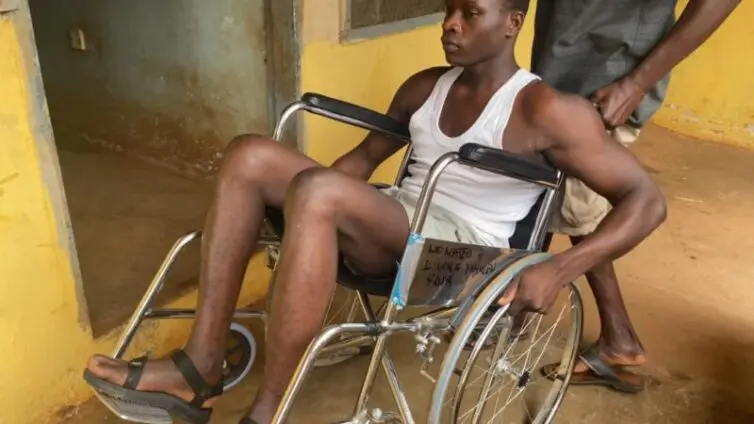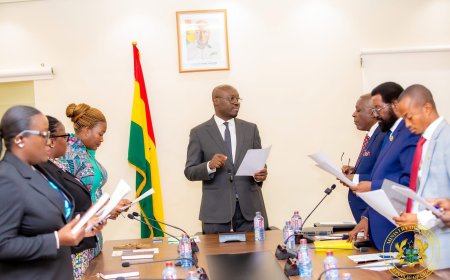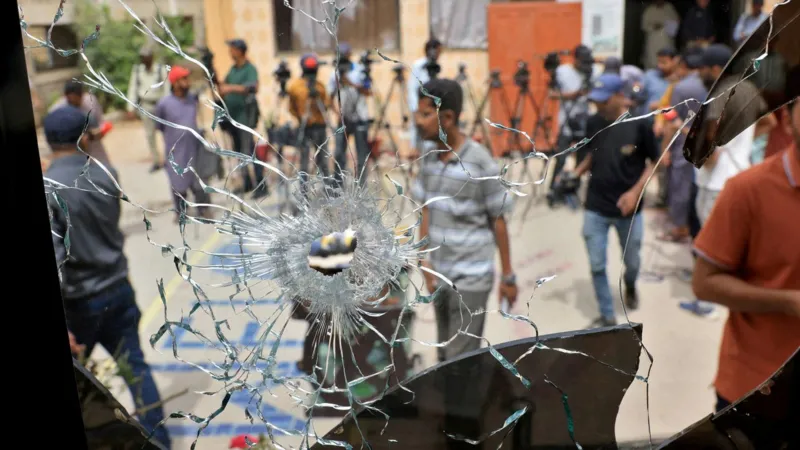Where hope fails: Ghana’s decaying home for the destitute

The Appiah story
On 3rd April 2024, Appiah Sunday, a 45-year-old died tragically.
Carried along on a stretcher, the lifeless body is on its way for burial without any family member present to bid farewell.

Appiah was a hit-and-run road accident victim, abandoned at the 37 Military Hospital in Accra, and later discharged to receive care from Ghana's only Central Destitute Infirmary in Asante Bekwai.
Social inquiry and medical reports reveal Appiah Sunday suffered from mental disorder, difficulty in speech and loss of memory before his admission into the infirmary.

“He was bedridden needing intensive care. Our caregivers were responsible for that. He virtually, couldn’t do anything for himself,” head of operations disclosed.
Appiah’s arrival at the infirmary was met with unforeseen conditions.
His stay at the infirmary was characterized by poor care, deteriorating his already petrifying health situation each passing day.
“Appiah developed sores all over his body. Our supplies were locked, and we lacked sanitary materials to hygienically control him, banking hopes on our own benevolence,” the head of caretakers revealed.
Requisite medication and professional care were in short supply. This characterized his treatment, despite being in a critical situation.
Head of operations of the facility disclosed that: “We are not trained medically to handle some cases. We administer any drug available with no capacity to assess whether we are good or harmful. Appiah couldn’t go for any review or any special medical advice. We tried our best,”
Appiah’s death uncovers a deep, yet scary, phenomenon of the conditions of the Central Destitute Infirmary in Asante Bekwai which happens to be Ghana’s only care home for the destitute.

Background
The facility established in 1957, by then Prime Minister, Kwame Nkrumah, was mandated to provide care and protection for the vulnerable, aged and disabled.
After six decades, the once vibrant society-like facility now stands in a state of neglect, yet continues to house over 40 inmates with reported medical, physical, social and psychological impairments.

Patients between the ages of 15 and 80 years with mobility issues, low IQ, visual, hearing and speaking impairments are all admitted from around Ghana and even Africa hoping to access better care at the facility.
Bernard Ofori is the Head of Operations at the facility.
He reveals the facility is currently overwhelmed, admitting patients with situations beyond its available means and resources.

“The Court gives the care order clearance to send patients here so we have little to say. We get cases, direct mental and medical matters that we are not trained to handle. It is almost as if the hospitals just want to offload patients here” he said.

Infrastructure
The facility, currently overstepping its mandate to cater to extremely dire health and social cases, is incapacitated in terms of infrastructure to provide comprehensive care.
Some housing structures are abandoned due to engineering defects, weakened blocks and a death-trapped structure.

In one stark example, three inmates with varied situations are crammed into one empty Spartan room in the shade of rusted roofing.
Paradoxically, the non-compliance to universal health coverage is in full manifestation as the destitute infirmary relies on a non-existing sick bay.
Patients risk death in emergencies, as transportation is ridden with a lack of a vehicle and access to public transport.
“The lack of a transportation system here is worsened with a disdain stigma attached to this place, which prevents public transport from coming here,” he added.
Living Conditions of Inmates.
In their eyes can be seen the cry for help.
The agony of being neglected and lacking love is more visible.
This is the story of inmates who are abandoned by family, and society seeking care in the destitute infirmary.

Akua Grace is a 70-year-old with a saddening story to share seeking refuge at the destitute infirmary.
Her hearing and speaking impairment is not just an ordeal but a recipe for her abuse.
Every night, the frail elderly woman endures the disgust of sexual abuse from insensitive intruders who grab advantage of the infirmary’s lack of security.
The facility has no wall and one security person, exposing residents to dangers like the horrors of Akua Grace.
Akua’s right to dignity and against torture are crushed as she is regularly subjected to physical, psychological and emotional harm.
Sign language interpretation disclosed that, “every night some men come here to have sexual intercourse with her. She has grown accustomed to it, as though it is normal. So we always have to lay an ambush in efforts to grab the perpetrators,”

At the Psychiatric Department of the Komfo Anokye Teaching Hospital (KATH), Head of Department Dr Ruth Owusu-Antwi learns of the story.
A psychiatric assessment of Akua Grace, exposed she could suffer from anxiety and post-traumatic disorders, worsening her already bereaved mental condition.
“A thought-to-be safe haven has become more detrimental to her putting her at risk of depression and anxiety. At a point she will start seeing strange images and hear voices in her head. She becomes extremely paranoid. And that is very worrying. She needs help now,” she said.
In the same vein, same story of neglect and disaffection, Kojo Ntiamoah brawls his life through.
Kojo Ntiamoah was released from the Kumasi Central prison, after suffering paralysis; an accident from carrying loads.
The energetic young man is now immovable in a wheelchair marred with displeasure as his movements are restricted.
A glaring disregard for disability consciousness as he maneuvers his movement in the disability-unfriendly environment of gravel and tree vines.
The facility's environment is the complete opposite of the provisions in the Disability Act that insist on the modification of buildings, structures and environment to ensure accessibility for persons with disabilities.
“I had to quit my physiotherapy sessions because no one could afford it. Not my family, not the facility. And I am stuck in the room,’ he decried.
Condition of staff
Juliana Mensah, head of caretakers howls over the embattled lack of food supplies, and the abject deteriorating living state of inmates causing staff to forfeit their salaries for inmates’ survival.

“We endure unbearable situations here, lacking almost everything needed to survive. Not even firewood. Leaving inmates to our benevolence as staff,’ she said.
Aside from the dreadful living conditions of inmates, the facility is severely understaffed. The community-like environment is handled by 11 staff.
With no on-site accommodation, staff staying far away spend half of their salaries on transportation.
The social development officer of the Destitute Infirmary, Florence Bio says the majority who are caretakers are prime in age, affecting their report time and effectiveness.
“Four of the five caregivers are old to carry bedridden, patients. And they work overtime. The facility only house only two of the five, a good excuse for the rest to report late” she said.
The limited number of social workers and volunteers has compelled them to overstep their responsibilities and benevolence by performing roles beyond their expertise.
Despite working in traumatic environments, the unpaid salaries of some of these workers and volunteers span over four years.
Yaw Owusu, is a laborer who almost shed a tear, talking about his heavy workload straining his aging body.
“Like myself, pensioners ignore labor regulations to work overtime here”
Operations and Funding
The systematic shortcomings in the services of the Central Destitute Infirmary in Asante Bekwai are largely linked to insufficient funding and government neglect.
The infirmary bears the cost of emergency cases of patients transferred to health care centers in the Bekwai Municipality.
“Aside from improvising, referrals for critical conditions, compel the facility to bear costs not absorbed by any social scheme” Mary Anaman, Principal Community Health Officer.
So far, only 7 inmates are enrolled under the Livelihood Empowerment Against Poverty (LEAP) programme with an average of GHC1,700 monthly, with 27 inmates in line seeking enrollment into the LEAP programme.
The facility is waiting for its three-month fund supply arrears as they improvise to cater for 45 inmates at the mercy of donors and benevolent entities.
“We received funds from the social welfare department once this month. And that’s only 0.01% helpful. Terribly insufficient” Florence Bio said.
Call for action
In the third quarter of 2024, the Minister for Gender, Children and Social Protection, Dakoa Newman, announced that the government has earmarked GH¢400,000 to refurbish the Bekwai Central Destitute Infirmary in the Ashanti Region.
Management denies receiving the said allocation.
The social development officer of the Destitute Infirmary, Florence Bio is concerned about widened of funding span for the facility.
“We need more of the inmates enrolled under the LEAP. We even pay utility bills as a social facility, straining our capacity,” she said.
Reverend Cyril Benedict, Founder of the Accident Victims Support Ghana, and Dr Ruth Owusu-Antwi, of the department of behavioral sciences at the Kwame Nkrumah University of Science and Technology, lend their voices to the call for reforms.

“We need to treat this as a serious canker that can extend to anyone at all. The more reason is that lives are on a red line,” Reverend Cyril Benedict said.
Dr Ruth Owusu-Antwi, is professing the urgent need of a clinical psychologist and a mental health community nurse to lessen the mental burden the dismal situations will have on inmates.

The structural failure of social welfare and health care services in the Bekwai Central Destitute Infirmary is depriving the most vulnerable of the essential care they need.

The need for urgent intervention is greater as lives are on the brink of perishing without proper care.
Source: Clinton Yeboah
























































